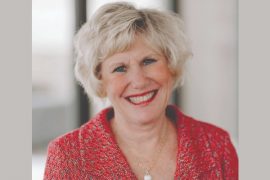By Hannah Wente | Photography by Hillary Schave
It’s an inescapable fact of life: we all age. We hope that we’ll be able to take care of ourselves forever, but it’s inevitable that the majority of us will need some varying degree of help with daily tasks as we get older, whether it’s housework, running errands or maintaining our finances. Until then, many of us (the vast majority of which are women) are tasked with caregiving for our own loved ones as they age.
According to a 2020 report by the National Alliance for Caregiving and AARP, nearly 42 million U.S. adults provided unpaid caregiving services to adults 50 years and older, most of which (89%) were relatives. In Wisconsin, there are 578,000 caregivers (according to a 2013 Respite Care Association of Wisconsin report, the latest available). It’s estimated that families provide 80% of all care for an average of four years, according to the Wisconsin Family and Caregiver Support Alliance.
Since the pandemic, more families in the U.S are choosing to cohabitate in order to care for an aging family member (a common practice in other countries), according to Jennifer Fischer, director of the Aging & Disability Resource Center of Dane County.
“You don’t have to live with someone to be a caregiver,” she says. “You still have that stress and feeling of being responsible.”
Whether a family lives together or on opposite sides of the country, Fischer says having those important conversations about where a family member should go if they can’t live independently anymore are crucial.
“The decisions you make during a crisis are not the same as if you had time to sit down and make a plan,” she says.
If this scenario comes up for your family, case managers are available at senior centers to help you. And, if you end up needing to provide caregiving services to a family member, you’ll want to consider the following:
- First of all, discuss your relative’s wishes as they age — what do they envision? What setting would they ideally want to live in? How will this impact the entire family?
- If an older family member needs to move in with you, what accommodations would you need to provide within your home to make it accessible for them? For example, they may need a zero-entry shower, grab bars or a bedroom on the main floor.
- Will your work schedule allow flexibility for you to be home or check on your family member frequently?
- Talk with your siblings, extended family and family friends about how to split caregiving duties to cover vacations and self-care time.
“We’ve all gone through family caregiving issues,” says Cheryl Batterman, manager of the Dane County Area Agency on Aging (AAA). “If you’re not a caregiver now, you will be a caregiver in the future. The hardest part is to identify that you are a caregiver.”
ASKING FOR HELP
Being a caregiver doesn’t mean you have to go it alone. Many agencies, such as the ADRC and AAA, support family caregivers so they don’t experience burnout, and also help retain the dignity of care recipients.
Lisa Schneider, co-chair of the Wisconsin Family and Caregiver Support Alliance and the Executive Director of the Respite Care Association of Wisconsin, says family caregivers often seek in-home care to help with lifting, transfers, bathing and grooming, and transportation to medical appointments.
However, many are hesitant to accept services. A 2016 survey of 500 Wisconsin caregivers found that 93% of caregivers worried the quality of support would go down for a loved one if they were not there.
“Caregivers are the last ones to ever ask for help,” Schneider says, “because there’s guilt connected to that.”
Not feeling alone is important. We talked to three Madison-area caregivers about their experiences caring for older family members, and the challenges and joys that this oh-so-important role allows them.
Zolonda Eubanks, 61, was living with her two kids years ago when her mom (who asked to not be named) moved in. After Eubanks’ mom retired, she moved back to her hometown of Birmingham, Alabama, but it wasn’t long before she returned back to Madison to live with Eubanks, due to health reasons.
“I have family members in denial that she needs care,” Eubanks says. “The only time they’ve ever seen her is when she’s ‘mom.’”
She recommends that others with aging parents get support and family buy-in early on.
“I did not realize that I would not have the support of my siblings except for my sister,” she says. “If we were all in this together, it would be an easier journey for all of us. I would never advise anybody to try and take it all on by themselves; it’s near impossible.”
As medications are adjusted and health issues arise for both Eubanks and her mother, every day is new and challenging. She often puts her own care on the back-burner.
“I have congestive heart failure, and I’m trying to get my diabetes under control,” she says. “But I live under stress every day.”
Caregiving during COVID-19 has provided even more challenges.
“This past year has been such a big challenge,” says Eubanks. Prior to the pandemic, her mom would attend exercise class twice a week, but now she says, “I can count on one hand the number of times she has left the house.”
Eubanks is a budget and policy analyst for the State of Wisconsin and says going into the office a few days a week is therapeutic. She’s grateful for coworkers and supervisors who understand her caregiving situation and give her the flexibility to handle issues as they arise.
“I am going to do this ’til the day she dies or I die,” she says, because she wants to be close to her mother until the end.
Qytina Triplett was in high school when she knew she wanted to work in healthcare. Today, the 38-year-old shares caregiving responsibilities for her father, Terry Triplett, with her mother, Shirley Triplett. Caregiving is something she was eased into when her mom was caring for her mother (Triplett’s grandmother) and her nieces.
She’s thankful that a previous job as a resident assistant taught her skills to manage many of her dad’s medical issues at home.
“It’s a known fact that you take care of your loved ones,” says Triplett. “I know I get a lot of flack from a lot of people, like ‘you just can’t catch a break.’ But it is an absolute pleasure to take care of the people you love.”
When COVID-19 hit last spring, Triplett lost her job in customer service. She also put pursuing her bachelor’s degree in healthcare management and business at Concordia University on hold to help her mom provide care for her dad.
“As an only child, I knew that I would eventually be in this role,” Triplett says. “It has had very scary moments and frustration, because sometimes you just don’t know what to do, and you’re scared. You’re watching them change, and you don’t necessarily know what to do in that moment. But I’m so grateful to have worked in the places that I have worked, to see the changes. Being a resident assistant, working for a durable medical equipment company … I think everything has worked full circle.”
Maureen Berigan is the baby of the family, but at 51, her five older siblings finally respect what she does for their parents. As a single mom of two sons and a daughter, she started living in adjacent apartments to her parents when her kids were growing up. Three years ago, they all decided to move in together to consolidate bills and transportation.
“I’ve always had a good relationship with my parents, but even now it’s more of a positive [experience],” she says. “My kids (21, 18 and 14) are able to see how things are, and it’s nice for them to experience this as well.”
Maureen works part-time at LensCrafters. As a care- giver for her parents, Jeanne and Leroy “Skip” Berigan (who are both 88), she keeps track of their medications, transportation and medical appointments. A self- described “helper,” she feels fortunate that she doesn’t have to manage dementia or other major medical issues (her dad gives a thumbs up upon hearing this during our interview). But there are still days when she feels overwhelmed, and she requests 20 minutes alone to decompress in her room, which everyone obliges. There are also days she walks for miles with their new puppy to have her alone time.
“[My parents] help me if I’m having a rough day and need to talk to an adult that’s not my child,” says Berigan. “Sometimes I don’t want to tell [my mom] things because she’s my mom and then I’m like, ‘I’m 51 years old, I can talk to my mom as an adult.’ I’m becoming more like friends with my mom than a mother-daughter relationship. I’m having more adult- like conversations with them than I would have had as a younger person, or if I wasn’t living with them.”
Caregiving RESOURCES in Wisconsin
THE AGING & DISABILITY RESOURCE CENTER (ADRC) OF DANE COUNTY is a one-stop resource for all aging-related needs and planning. ADRC social workers provide case management at area senior centers and can even facilitate family meetings. Spanish, Hmong (through The Hmong Institute) and interpreter services for all other languages is available. daneadrc.org
NEWBRIDGE has three locations in Madison and provides in- home needs assessments for older adults, case management and home chore support. In non-COVID times, they provide weekly meals and socialization. newbridgemadison.org
RESPITE CARE ASSOCIATION OF WISCONSIN (RCAW) supports family caregivers who are caring for loved ones across the lifespan. They recruit and train respite care workers and offer grants that pay for respite and other services that provide relief to family caregivers, such as hiring out snow shoveling and lawn care, or minor home adaptations. respitecarewi.org
AREA AGENCY ON AGING (AAA) administers caregiver grants of up to $1,200 per year for families to try out weekly adult day care, grooming/bathing support, home modifications or respite care for one week a year for the caregiver to take a vacation. Trualta is a free online caregiving database offered by the AAA. It includes information on safety skills, like how to help someone shower, and what to do for self-care. The AAA also runs a Facebook group called the Dane County Caregiver Alliance. aaa.dcdhs.com, facebook.com/servingcaregivers.
WISCONSIN FAMILY CAREGIVER SUPPORT ALLIANCE (WFACSA) offers virtual support groups and the Powerful Tools for Caregivers class. Find out more at wisconsincaregiver.org/alliance




